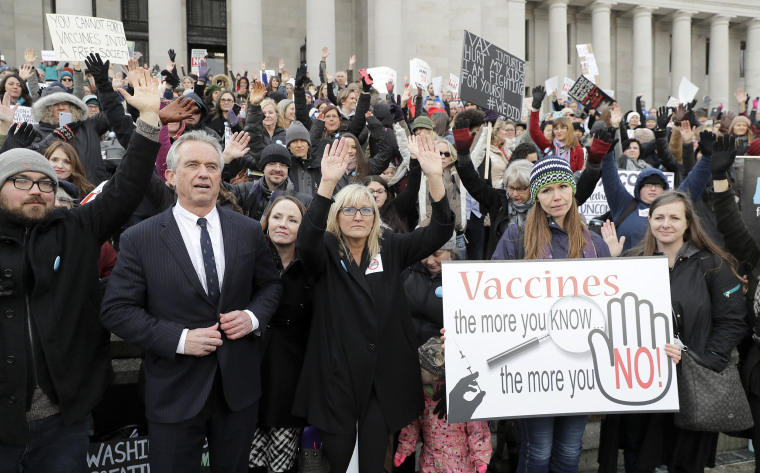RFK Jr. comes ‘home’ to his anti-vaccine group, commits to ‘a break’ for U.S. infectious disease research
At an anti-vaccine conference in Georgia on Friday, presidential candidate Robert F. Kennedy Jr. confirmed his commitment to the cause and spoke to his base about how he, as president, would serve the movement he built.
“I feel like I’ve come home today,” he said to a standing ovation, crediting the assembled audience with his candidacy.
He then laid out his vision for a Kennedy presidency, which would include telling the National Institutes of Health to take “a break” from studying infectious diseases, like Covid-19 and measles, and pivoting the agency to the study of chronic diseases, like diabetes and obesity. Kennedy has suggested without evidence that researchers and pharmaceutical companies are driven by profit to neglect such chronic conditions and invest in ineffective and even harmful treatments; he includes vaccines among them.
“I’m gonna say to NIH scientists, God bless you all,” Kennedy said. “Thank you for public service. We’re going to give infectious disease a break for about eight years.”
Kennedy’s remarks came at the end of the first day of a conference for the country’s largest anti-vaccine organization, Children’s Health Defense. Kennedy signed on with Children’s Health Defense in 2015 and served as its chairman and chief litigation counsel until April, when he announced he would go on leave to run for president.

Currently running as an independent candidate, Kennedy is polling favorably among voters across the political spectrum. In a hypothetical 2024 general election matchup, according to a Quinnipiac University poll this week, Kennedy received 22% support against Biden (39%) and Trump (36%).
Kennedy has mostly shied away from anti-vaccine advocacy on the campaign trail and has said, despite years of public statements to the contrary, that he is not opposed to vaccines. This spring, he told NBC News vaccines were “not an issue that I’m leading with.”
A representative for Children’s Health Defense declined my request to attend the conference in person, citing my record of “reporting on CHD’s themes and activities.” NBC News paid $275 for a virtual ticket and watched the conference via a livestream provided to remote attendees.
In the hourlong speech, Kennedy covered well-worn subjects, railing against the evils of pharmaceutical companies, warning against researchers who he said improperly frame scientific findings for profit, and expounding on conspiracy theories around Covid measures, including what he called the “totalitarian regime” that controls public health and censorship of dissenting voices. Referring to vaccines, he said to the mothers in the audience: “You have a duty to do research when you’re giving your child a medical intervention.”
In addition to his proposed moves at NIH, Kennedy said that as president, he’d appoint a like-minded attorney general, “maybe Aaron Siri,” he said. Siri is a lawyer who has done millions of dollars of work for leading anti-vaccination groups, including a recent case that opened up religious exemptions for childhood vaccines in Mississippi. The crowd erupted in applause.
He said he would use the power of that attorney general to threaten editors of medical journals and force them to publish studies that had been retracted (he often cites the retracted studies saying ivermectin, a parasite drug, is an effective treatment for Covid). “We’re gonna say we’re fixing to file some racketeering lawsuits if you don’t start telling the truth in your journals.”
Before Kennedy’s speech, an announcer told the crowd that as a nonprofit, Children’s Health Defense does not endorse political candidates. But evidence of Kennedy’s anti-vaccine support is abundant. Children’s Health Defense’s employees have been selling merchandise at Kennedy campaign events, and its current president served as a strategist, fundraiser and organizer for Kennedy’s campaign. The super PAC supporting Kennedy’s candidacy is run by a former president of Children’s Health Defense’s New York chapter.
Most Americans, particularly Democrats, do not share Kennedy’s skeptical views on vaccines, but confidence in vaccines has fallen post-Covid. A small but growing number of Americans believe that vaccines are unsafe and can cause autism, which is false, according to a new survey from the University of Pennsylvania’s Annenberg Public Policy Center.
Children’s Health Defense cheered the increasing distrust of vaccines during the pandemic, calling drops in childhood vaccination rates Covid’s “silver lining.” The swell in attention on vaccines and Kennedy’s enthusiastic activism against them served Children’s Health Defense well. In 2021, the group raised nearly $16 million, more than 4 times its revenue in 2019. Kennedy’s salary grew to more than $500,000.
Kennedy’s remarks closed out the first day of the conference. Earlier speakers included other heroes of the anti-vaccine movement: Paul Thomas, an Oregon pediatrician whose medical license was suspended and ultimately surrendered after he failed to adequately vaccinate his patients; James Lyons-Weiler, an activist who incorrectly claims a gene sequence in Covid proves the laboratory-origin hypothesis; and Andrew Wakefield, the physician stripped of his license over a retracted study that popularized the false belief that the measles, mumps and rubella vaccines cause autism.
“I want to thank all of you for being on the front line in this battle,” Kennedy said as he concluded, before pausing. “I don’t think I can say anything that’s campaign-related, but anyway you know what to do.”
After his remarks, attendees were invited to a cocktail reception and dinner with Children’s Health Defense leaders, conference speakers and “medical freedom fighters.” The event is to include a silent auction and a ceremony for the group’s new “Defender Award.” The award’s inaugural recipient, recognized for “his courage and steadfast commitment to truth and liberty,” is Robert F. Kennedy Jr.


